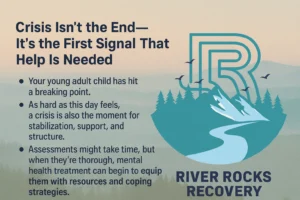You’ve just lived through the moment you hoped would never come.
Maybe your son screamed that he couldn’t do this anymore. Maybe your daughter disappeared for hours—or days—and came back hollow-eyed and shaking. Maybe you found a note, or got a call, or watched them come apart in front of you.
When your young adult child is in a behavioral health crisis, nothing prepares you. And in the quiet that follows, one question becomes louder than everything else:
Now what?
If you’re in Middletown or nearby areas like Dayton, Ohio, River Rocks Recovery provides trauma-aware, family-inclusive mental health treatment for exactly this moment—not just the meltdown, but everything that comes after.
Crisis Isn’t the End—It’s the First Signal That Help Is Needed
When your child hits a crisis point, it can feel like a complete breakdown. And emotionally, it is. But clinically, this is often the beginning of something new: recognition, clarity, and the start of meaningful care.
You’re not alone in feeling lost. Many parents feel guilt, shock, or even shame in the aftermath. But what you witnessed—whether it was a panic attack, suicidal ideation, psychosis, or violent outburst—wasn’t your fault. And it’s not the end of your child’s story.
What happens next is stabilization, support, and structure.
Mental health treatment offers a path forward, even if the path isn’t yet clear to you.
Step One: Stabilizing the Immediate Emotional and Physical Risks
After a mental health crisis, the priority is simple but critical: keep your child safe.
This could involve:
- A visit to the ER or psychiatric facility for immediate evaluation
- Crisis intervention by first responders or a mobile mental health team
- Temporary inpatient hospitalization for suicide prevention or psychosis
- Short-term medication management to reduce risk and distress
If your child is no longer in immediate danger, this is when outpatient mental health services become essential. At River Rocks Recovery, we often help families transition from acute care to sustained support.
And if you’re in West Chester, Ohio and looking for a mental health program that bridges clinical care with emotional understanding, we’re here to help you navigate that step.

Mental Health Assessments Take Time—And That’s Okay
In the chaos of a crisis, you might be handed a diagnosis or treatment plan within hours. That can be helpful—but it can also feel sudden and overwhelming.
It’s okay to question it.
It’s okay to take a breath and gather more information.
It’s okay to ask: What does this really mean for my child and our family?
At River Rocks, we don’t treat paperwork. We treat people. That means we conduct comprehensive, ongoing assessments—not just a checklist on day one. We look at:
- Mental health symptoms (anxiety, depression, trauma, psychosis)
- Family history and dynamics
- Social and school or work-related stressors
- Substance use, if relevant
- Trauma exposure
- Emotional patterns over time
Your child’s needs might evolve over days or weeks. The right mental health treatment should evolve with them.
The Parent Role: Present, Powerful, and Imperfect
Let’s name this: many parents in this situation feel like they failed.
You didn’t.
You noticed. You stayed. You’re reading this—which means you’re still fighting for them.
You might not know what to say or how to fix it. That’s okay. In most cases, your child doesn’t need you to fix everything. They need to feel believed, protected, and loved without conditions.
Your presence is more powerful than perfection.
We help parents reclaim their role—not as the savior, but as a steady, loving anchor. That includes:
- Education about your child’s symptoms and possible diagnoses
- Coaching on communication during emotional highs and lows
- Boundaries that protect both you and your child
- Family sessions to rebuild trust and safety
You don’t have to become a therapist. But your voice matters. So does your capacity to stay, even in the mess.
What Mental Health Treatment Looks Like After a Crisis
The right treatment after a crisis depends on your child’s stability, willingness, and needs.
At River Rocks Recovery, we offer multiple levels of care so we can adjust based on where your child is today—not just where we hope they’ll be tomorrow.
Treatment options may include:
- Outpatient therapy: Weekly sessions with a therapist to build coping skills, emotional awareness, and trust
- Intensive outpatient program (IOP): Multiple sessions per week for deeper work on mood regulation, trauma, and relationships
- Psychiatric consultation: If medication might support stabilization, we coordinate this with local providers
- Family involvement: You’re included in the plan where clinically appropriate
We serve families from Middletown, Dayton, and West Chester, Ohio, helping both young adults in care and the parents who love them find a sustainable way forward.
What Progress Actually Looks Like
Progress after a meltdown doesn’t usually look like a quick turnaround. It’s more often slow, nonlinear, and full of learning.
Your child might seem better one week, then regress the next.
They might open up, then shut down again.
They might resist therapy, or even say they hate it.
That doesn’t mean it’s not working.
What we look for is:
- Reduced emotional volatility
- Healthier coping behaviors (less self-harm, more expression)
- Willingness to engage, even when uncomfortable
- Moments of reflection or insight
- Improved safety and emotional regulation
Think of it like emotional rehab. It takes time to rebuild trust, language, and internal scaffolding that can hold pain without collapse.
Common Fears—and Gentle Answers
What if they refuse help?
This is common. Resistance is often fear in disguise. We work with parents on how to approach conversations, set loving boundaries, and offer options instead of ultimatums.
Will they be okay?
This is the hardest question—and the one every parent carries. While we can’t promise outcomes, we can promise that mental health treatment helps. It creates pathways where before there was only chaos.
Is this my fault?
No. Full stop. Even in complex family dynamics, no single moment causes a breakdown. What matters now is what you do next—and we can help with that.
FAQ: What Parents Want to Know
How soon should treatment begin after a crisis?
As soon as emotional and physical safety is established. Often within days or weeks of a crisis, outpatient or IOP programs can begin, depending on the individual’s needs.
What age range do you treat?
We work with young adults (typically ages 18–30), many of whom are navigating transitions, identity, trauma, or untreated conditions that surfaced during or after adolescence.
Do you work with families outside Middletown?
Yes. We serve families across the region, including those in Dayton and West Chester, Ohio. If your child needs outpatient mental health treatment after a behavioral health crisis, we can help coordinate care nearby.
How can I be involved without overwhelming them?
Our family programming helps you find the right level of involvement. We’ll guide you through what helps—and what to avoid—so you can stay connected without adding pressure.
When the Crisis Passes, the Healing Can Begin
What happens after the meltdown isn’t about blame—it’s about rebuilding.
There is no perfect script for parenting through a mental health emergency. But there is support. Structure. Real help for families who want to move from survival to stability.
Whether your child is just beginning to talk, or refusing to talk at all, there is a next step. And you don’t have to figure it out alone.
We’re here when you’re ready.
Call (888) 905-6281 to learn more about our mental health treatment services in Middletown, Ohio. We help families in Middletown, Dayton, and West Chester take the next step—with clarity, care, and compassion.




























